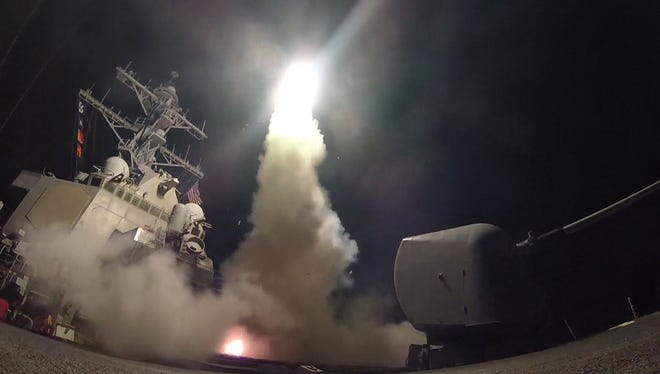Schneider: Use caution before entering Syria's snakepit

“No operation extends with any certainty beyond the first encounter with the main body of the enemy,” cautioned German Field Marshal Helmuth von Moltke in the mid-19th century.
And thus, after Syrian President Bashar Al-Assad launched a deadly chemical weapons attack on his own people earlier this week, President Donald Trump did something he had previously mocked others for proposing: He fired American missiles into Syria to destroy the airfield that Assad used to launch the chemical attack.
When Democrats fought against a Trump presidency, this is the exact worst-case scenario they had in mind; they couldn't imagine handing America's military might to a mercurial, undisciplined television star with little knowledge of the dangers lurking in the tumultuous Middle East.
Yet to their credit, Democratic leaders largely have supported Trump's action of Thursday night. Senate Minority Leader Chuck Schumer (D-NY) said that "making sure Assad knows that when he commits such despicable atrocities he will pay a price is the right thing to do." Democratic House Minority Leader Nancy Pelosi called the strike "a proportional response to the (Assad) regime’s use of chemical weapons," but, like Schumer, urged more congressional input in the future.
Many in the media were quick to point out that Republican leaders who opposed President Barack Obama's proposed military strikes in Syria in 2013 quickly backed Trump's order on Thursday. But in fairness, it is much easier to express support for an operation that already has been executed successfully than it is to support a proposed action for which the repercussions are unknown. For both Democrats and Republicans, condemning Trump's limited actions this week would mean opposing an American military victory.
But whether armed conflict in Syria is in America's interest is still the primary question worth asking.
Trump himself said one of the fundamental reasons he launched the attack was because he was affected by the gruesome pictures and video of children being gassed to death. “That attack on children yesterday had a big impact on me — big impact," Trump said on Wednesday. "That was a horrible, horrible thing. And I’ve been watching it and seeing it, and it doesn’t get any worse than that.”
Yet no matter how nauseating those images are, they don't by themselves warrant a good enough reason for beginning military conflict. If Trump checked more than his Twitter feed, he'd see atrocities all over the world; for instance, one recent report detailed mass rape and killing in the Darfur region of the Sudan. According to the United Nations, 300,000 people have been killed in the genocide carried out by the government there since 2003. And yet the United States hasn't deemed the area worthy of large-scale military action.
Perhaps in striking Syria now, Trump is sending a message to other nations that human rights abuses will not be tolerated. After all, Obama laid down a red line against such violations and Trump seems intent on enforcing it.
But such action is fraught with peril. If Syria escalates its actions to provoke the U.S., how will Trump respond? During the presidential debates, Trump defended Assad, saying he was at least helping fight radical terror organizations such as ISIS.
But if war against Assad intensifies and the U.S. commits to regime change, what happens next? Do we hand the country over to ISIS terrorists? Syria is currently a free-for-all; even insurrectionist groups backed by the U.S. have begun fighting against one another. And even if America were able to affect regime change, enforcing such a change could mean a controlling military presence in Syria for decades. Ring a bell?
And, oh yeah, there's the small matter that Russia and Iran might have something to say about escalated U.S. military involvement, as well.
Now that Trump has begun to flex his military muscle, America better hope the Democrats' initial reservations about his judgment weren't correct. Thursday's operation may have been a short-term success, but the U.S. would be best served by exercising long-term caution. Perhaps getting tough with Assad will serve America's security interests, but, like Obama before him, Trump has yet to make the case.
Christian Schneider is a Journal Sentinel columnist and blogger. Email cschneider@jrn.com. Twitter: @Schneider_CM